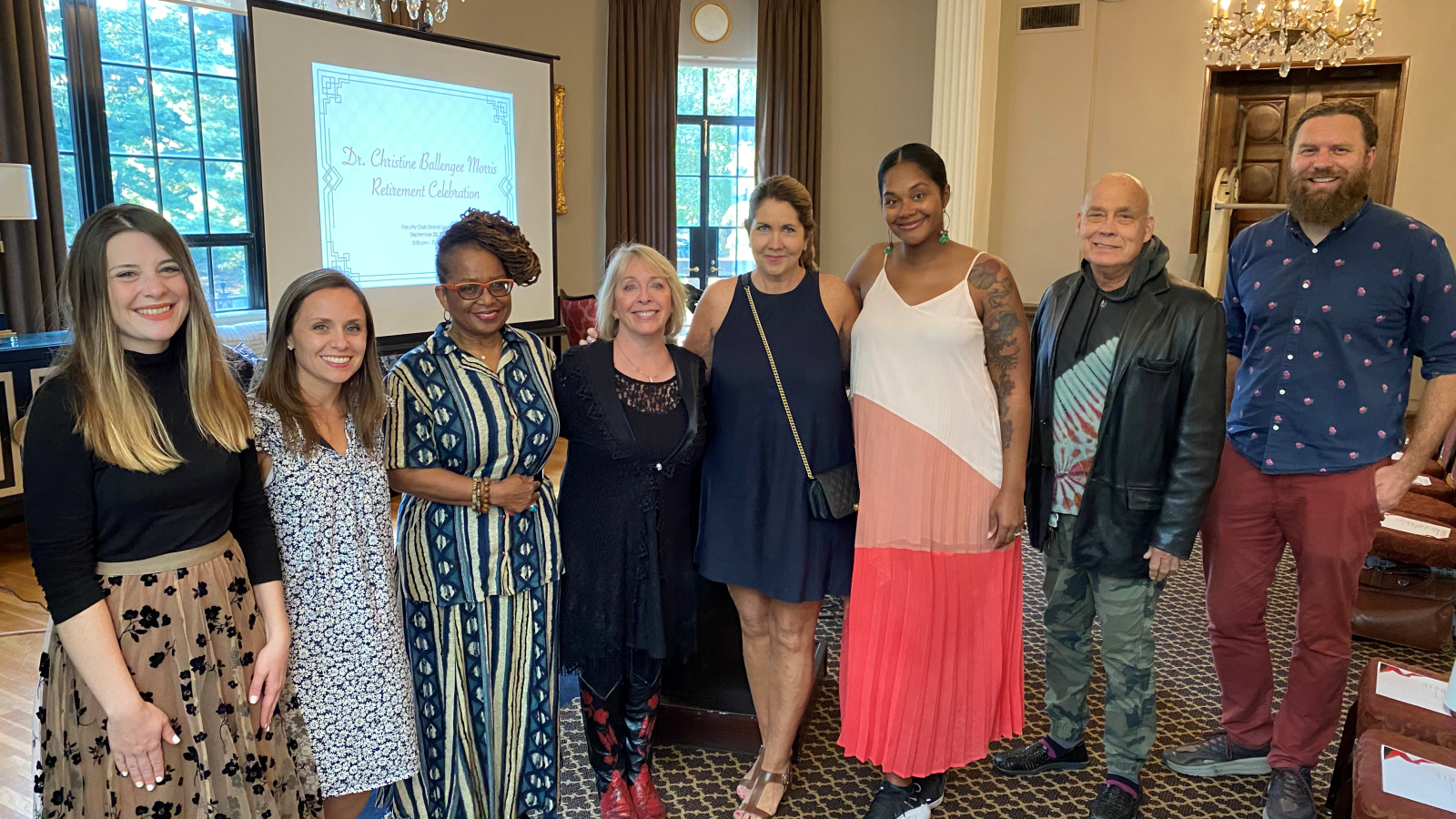
Some participants gathered at Professor Christine Ballengee-Morris’ retirement party. From left to right: Brittany Shelton, Lauren Pace, Vesta Daniel (Faculty Emeritus), Christine Ballengee-Morris, Shari Savage (Associate Professor), Joni Acuff (Professor and Department Chair), Jim Sanders III (Associate Professor) and Richard Finlay Fletcher (Associate Professor).
In August 2021, the artist and scholar Dr. Léuli Eshrāghi (Sāmoan: Āpia, Salelologa, Si‘umu, Leulumoega), with whom I had worked on the reading room of Indigenous art books installed at Columbus Printed Arts Center (2020-2022) and as part of the exhibition Whisper into a Hole (April 2022), sent me an email asking for institutional support for an exciting art writing residency they were coordinating with the Canadian art magazine and organization Momus. The Momus Emerging Critics Residency was called “Writing Relations, Making Futurities: Global Indigenous Art Criticism” and would be held virtually in February 2022 and was open to Indigenous-identifying applicants and funded by academic and arts institutions. As the description noted, the residency would be ‘dedicated to global Indigenous art criticism, history, theory, orature, and relationality. This gathering is a digital territory where shared destinies are fully recognized between our many homelands under settler colonial, militourist, and extractivist occupations.’
When thinking about ways to provide this support, it came to me that it would be a wonderful opportunity to celebrate the impact and legacy of Dr. Ballengee-Morris’ work in Indigenous arts, within AAEP and beyond. With department support, we were able to fund two scholarships for two Ohio State-affiliated students (current AAEP grad student Anna Freeman, and Ohio State alumna Indigo Gonzales Miller), but also two applicants not affiliated with the university (Nicole Furtado and Marina Perez). When a second Emerging Critics Residency was announced, AAEP continued to support our partnership with Momus, this time for Black art writers, with the title Because my metier is black…(after Toni Morrison), led by Jessica Lynne. In continued celebration of Dr. Ballengee-Morris’ work in social justice and art education, we funded two non-Ohio State participants (Camille Bacon and Chayanne Marcano).
The following are selected testimonials of Momus organizers and participants.
"Momus is committed to offering residencies and mentorship programs to a wide range of applicants, from emerging writers without publication experience to academics with PhDs to professionals with active bylines. Helping support and elevate underrepresented communities in our mentoring and publishing activities remains central to the work we do. Momus has been grateful to receive funding from academic institutions in the form of scholarships for their students to attend the residency program. We increasingly focus on working with consistent partners who share in our belief that programs such as the Momus Emerging Critics Residency should be made available to people outside of academia. It is essential to the health of our field that mentorship and professional development opportunities reach beyond traditional silos of power and influence. Richard’s allyship with the Department of Arts Administration, Education and Policy at The Ohio State University has been a rare example of this cultural-growth and resource-sharing perspective.”
– Lauren Wetmore & Sky Gooden (Momus)
"I am writing a letter of gratitude to your department for the tuition sponsorship providing the opportunity to participate as a resident in the Momus Emerging Critics Residency, led by Dr. Léuli Eshrāghi. Over the course of this residency, I am incredibly grateful for the opportunity to engage in discussions with other Indigenous scholars concerning their arts-based research as well as curatorial experience at various Indigenous and non-Indigenous art institutions. Even though I would have preferred more time, individually, with the wonderful session leaders for feedback on writing critiques, I was inspired to continue practicing from the encouragement of my fellow residents that have been maintained outside our session gatherings.”
– Indigo Gonzales Miller
"Mahalo nui loa (thank you very much) for your help and support towards my attendance of the “Momus Emerging
Critics Residency: Writing Relations, Making Futurities.” There’s no other way for me to put it—other than the MOMUS Residency was life-changing for me. It helped me build strong networks and relations with Indigenous scholars and artists worldwide. As an emerging art critic and scholar, this experience has been transformative. Meeting Indigenous professors and art workers around the world allowed me to conceptualize our connections and differences as we shared our localized experiences. As a Kanaka Maoli (Native Hawaiian) scholar, I felt heard, seen, and nourished by the seminars. We tackled difficult questions on how to decolonize museums and academic spaces across the world. Although each week attended to different Indigenous cultures and contexts, we connected our divergent perspectives through a trans-Indigenous approach that celebrated our stories and cultures.”
– Nicole Furtado
"I am writing in appreciation of your generous support towards my participation in the Momus Emerging Critics Residency: Writing Relations, Making Futurities. I am grateful for this opportunity to further my education and training as an emerging Indigenous arts writer and critic. The residency fostered a virtual learning space with great care and intention. I believe Léuli’s leadership and Sky and Lauren’s guidance led our cohort to have dynamic and engaging conversations and reflections. There were moments during the residency when I was challenged to think critically on sensitive topics pertaining to institutional violence. During these moments, I was grateful to be in a community that provided me with the opportunity for personal and professional growth. It was a great privilege to learn alongside an amazing cohort of Indigenous artists and scholars such as Indigo, Anna, and Nicole. At the end of each session, I left Zoom meetings feeling motivated and inspired for our collective future in Indigenous arts.”
– Marina Perez
